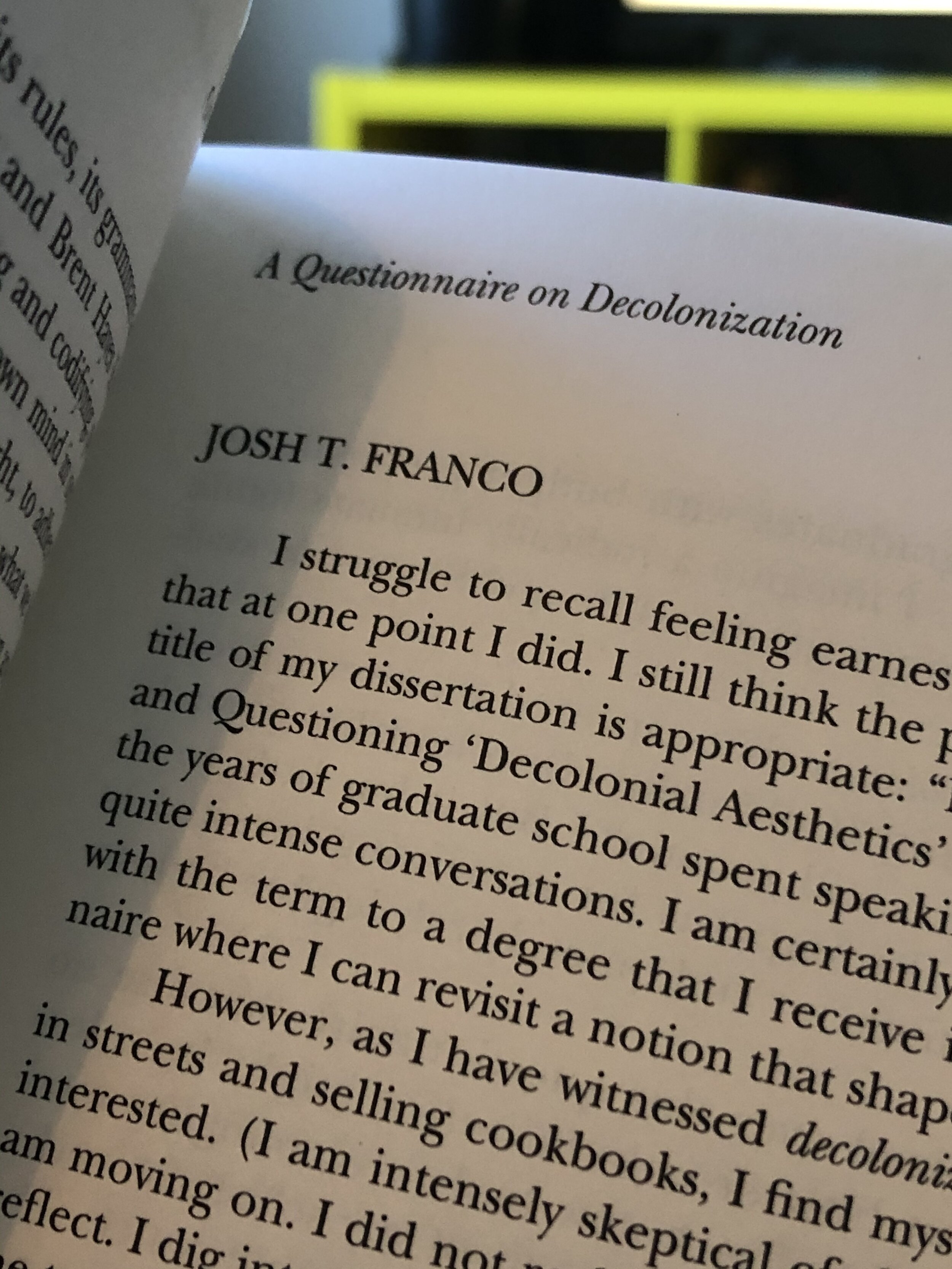


The prompt:
“The term decolonize has gained a new life in recent art activism, as a radical challenge to the Eurocentrism of museums (in light of Native, Indigenous, and other epistemological perspectives) as well as in the museum's structural relation to violence (either in its ties to oligarchic trustees or to corporations engaged in the business of war or environmental depredation). In calling forth the mid-twentieth-century period of decolonization as its historical point of reference, the word's emphatic return is rhetorically powerful, and it corresponds to a parallel interest among scholars in a plural field of postcolonial or global modernisms. The exhortation to decolonize, however, is not uncontroversial-some believe it still carries a Eurocentric bias. Indeed, it has been proposed that, for the West, de-imperialization is perhaps even more urgent than decolonization.
What does the term decolonize mean to you in your work in activism, criticism, art, and/or scholarship? Why has it come to play such an urgent role in the neoliberal West? How can we link it historically with the political history of decolonization, and how does it work to translate postcolonial theory into a critique of the neocolonial contemporary art world?”
Respondents include Nana Adusei-Poku, Brook Andrew, Sampada Aranke, Ian Bethell-Bennett, Kader Attia, Andrea Carlson, Elise Y. Chagas, ISUMA, Iftikhar Dadi, Janet Dees, Nitasha Dhillon, Hannah Feldman, Josh T. Franco, David Garneau, Renee Green, Iman Issa, Arnold J. Kemp, Thomas Lax, Nancy Luxon, Nelson Maldonado-Torres, Saloni Mathur, Tiona Nekkia McClodden, Alan Michelson, Partha Mitter, Isabela Muci Barradas, Steven Nelson, Ugochukwu-Smooth C. Nzewi, Alessandro Petti, Paulina Pineda, Christopher Pinney, Elizabeth Povinelli, Ryan Rice, Andrew Ross, Paul Chaat Smith, Nancy Spector, Francoise Verges, Rocio Zambrana, and Joseph R. Zordan.

Excerpt:
“I struggle to recall feeling earnest feelings about the term decolonize. I know that at one point I did. I still think prominent positioning of its cognate in the title of my dissertation is appropriate: “Marfa, Marfa: Minimalism, Rasquachismo, and Questioning Decolonial Aesthetics in Far West Texas.”i I do not at all regret the years of graduate school spent speaking and unravelling this term alone and in quite intense conversations. I am certainly not ashamed that my name is associated with the term to a degree that I receive invitations such as this one. A questionnaire where I can revisit a notion that shaped my life? Sure.
However, as I have witnessed decolonize become a graphic brand for amassing in streets and selling cookbooks, I find myself less and less invested. Less and less interested. (I am intensely skeptical of all large groups, whatever their politics.) I am moving on. I did not realize I was doing so until presented this opportunity to reflect. I dig into my own records to identify possible reasons for the distance from the term I now feel. I find a press clipping from the Austin American-Statesman: the review of MARFITA, the collaborative installation and performance work which I would ultimately unpack in the form of a dissertation after its culmination and premiere in 2011 (work began with my collaborators Natalie Goodnow, Alison Kuo, and Joshua Saunders in 2009). The penultimate line of critic Jeanne Claire van Ryzin’s review for the Austin American-Statesman reads: “‘Marfita’ troubles the boundary between two distinct groups that treasure Marfa with the same depth of reverence.”ii This is from the time I felt enthusiasm for decolonize as a discourse. This is when I was convinced it was about precisely this: “troubling boundaries.” Now, I witness decolonize marking clear lines between activists and authority figures tensely facing off in museum lobbies. Which side of the banner do you stand on?”
Read the full response here.